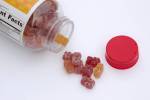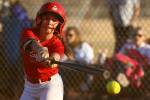Eat right for active lifestyle
By JORDAN WILSON
VIEW ON HEALTH
You can't put water in a car's fuel tank and expect it to get anywhere.
That's the type of scenario Julie Burns likens to the way most aspiring athletes approach nutrition. Burns, a nutrition expert who founded eatlikethepros.com and is the nutritionist for the Chicago Blackhawks, says that you can't put garbage into your body and expect it to turn that garbage into athletic performance.
Whether you're an avid athlete or just someone looking to last a little longer during a tennis volley, sports nutrition plays a vital role, Burns said.
So what's the easiest way to avoid putting water in your car's fuel tank? Stay away from processed foods.
"For all age groups, whether it's high school kids or older adults playing a round of golf, you have to stay away from processed food," Burns said. "Across the board, that is the demise of the athlete's diet."
"You're not going to be healthy, you're not going to perform well at your sport if you continue to eat processed foods."
When all else fails, opt for a natural or organic food.
"You want to be functioning for both mental, physical and emotional health, so you should eat as nature intended," Burns said. "You need premium fuel. And it is not in the box."
Hydration is a key component in the athletic mix. Even if you eat right, train right and mentally prepare, your athletic endeavors will be dead on arrival if you aren't hydrated. It's recommended to get about eight to 10 ounces of water for every 15 minutes of exercise. If you're going at it for a while, you should consume a sports drink every 90 minutes or so. In the hour before you start exercising, you should consume about 6-12 ounces of water.
Taking in enough food is another key element of sports nutrition. It's simple math. Calories equals energy. And you need energy to perform on the court, field or track. So anytime you increase your physical activity, an increase in caloric intake should follow to avoid exhaustion. There's no magic number that says how many calories you should consume. That is a highly individualized process, Burns said, and should be worked out with a trainer or nutritionist.
While there's no certain number that everyone should adhere to, there is a makeup of caloric intake that should stick for just about everyone. You might need a different amount of calories, but athletes should be getting their calories from the same places.
The President's Council on Physical Fitness and Sports sets forth basic guidelines for caloric intake. It says between 55 to 60 percent of the total calories in an athlete's diet should come from carbohydrates and less than 30 percent should come from fat. That leaves about 10-15 percent of daily caloric intake coming from protein sources.
Once you have the breakdown by category, then you have to focus on the sources of calories. That's the important part. This is also the demise of most people's sports diets.
You can't continue to fuel your body with junk food and drive-thru garbage, Burns said.
"Bad food has a tremendous adverse effect on your performance," she said. "Youngsters can get away with it because of their high calorie needs. But it will eventually catch up. All that fast food and hydrogenated oils affects your fatty acids. And that affects your brain and how you think. Whether you're on the ice or on the court."
The first step in the process is buying the right foods. Unless you are a health nut, you probably won't have the optimal sports nutrition foods sitting around in your cupboard or fridge.
"You have to shop at the right places," Burns said. "If you can't afford a place like Whole Foods, you should go to a farmer and at least buy meats that don't have pesticides added."
Don't just buy what you think is good for sports nutrition, either. For example, the whole "eat pasta all day every day" theory isn't a good one to follow.
"People think they need it before and after, that's ridiculous," she said. "A lot of people that do marathons, for example, think they need all these carbs. They say, 'I can eat all the pasta and sugar and candy I want because I'll burn it off. Yeah, you're burning the calories but it's not the right fuel. It's not the vitamins you need. It's just gas without the full package."
"Pasta can cause bloating and stomach aches because people can be intolerant to all the gluten," Burns said.
The right foods vary by age and what kind of sport you're participating in, Burns said. But there are some foods that work well for sports nutrition regardless of age or sport.
Grass-fed beef is one of the best places to start, Burns said. It has the right kind of fat and contains high amounts of clean protein. Other sure-fire winners include coconut oil, organic eggs, green vegetables and green drinks, such as natural tea.
If you aren't a serious athlete but still want to perform better athletically, nutrition is the best place to start. Just because your sport or activity may not be as grueling as professional football, it doesn't mean your choice of food should reflect that. The diet you want to follow for leisurely sports isn't far off from strict meal plans professional athletes use.
"If you're middle-aged and maybe not competing at as high of an intensity level, the only major difference is you don't need as many calories," Burns said. "There's not a huge difference in the foods you should be selecting. You should get enough clean protein and not focus on the carbohydrates."
You can make changes to your diet even if your sport doesn't demand as much physically. For example, hitting the links still calls for some changes in the diet if you want to perform at your best..
"If you're playing 18 holes of golf, you want to focus more on fluids and what you're having at the turn after the ninth hole," Burns said, noting specific nutritional needs vary greatly from sport to sport. "Golfers need different foods than marathoners. The right food is extremely important. For golfers, it's what they eat during a round. Nuts and seeds with sea salt help them keep their fluids and the protein helps recovery needs."
If you have to spoil yourself once in a while by eating out, your sports diet doesn't have to be doomed. You just have to chose a place that has the right foods.
"You want meat without chemicals and lots of vegetables and healthy fat like guacamole," Burns said. "The whole high carb theory -- it couldn't be further from the truth. It's wrong. You need to eat fresh and unprocessed foods. And you can't be afraid of (good) fat."
If you're getting enough calories, chances are you're getting most of the vitamins and minerals you need to stay in top athletic condition. However, a few vitamins and minerals play an especially pivotal role and you should be aware of these. Iron and calcium levels should specifically be monitored because regular diets tend to skip out on these two essentials. Low levels of iron will slow you down drastically on the field while not taking in enough calcium will leave your bones susceptible on the court.
Eating for sports might be a lot to swallow. But making these changes, Burns said, will result in a noticeable change in performance. In order to make it work, you have to take it slow. If you try to change everything over night, you might be setting yourself up for failure.
"You don't have to do all this at once," Burns said. "Start with one meal. If you're going out and want fast food, try and choose a place that has a little bit of vegetables and take off the bun or half of it. You don't have to do it all over night. But real food is critical."























